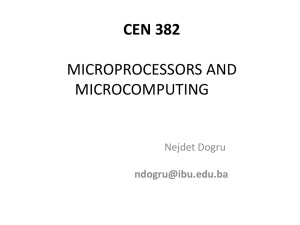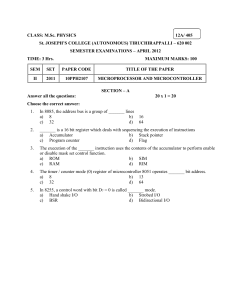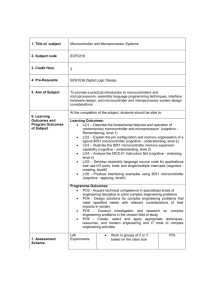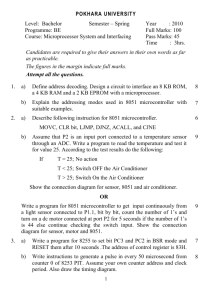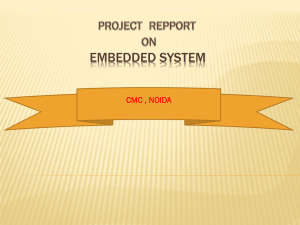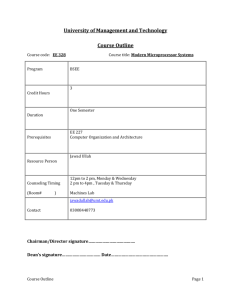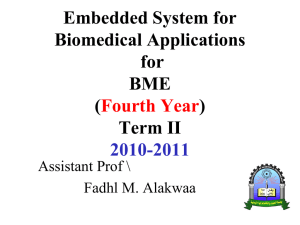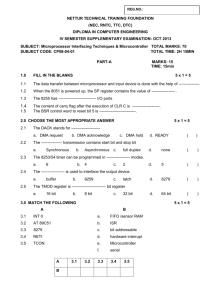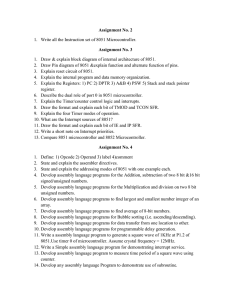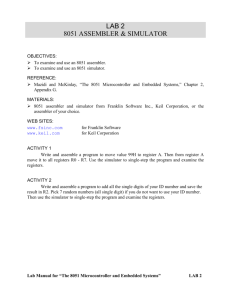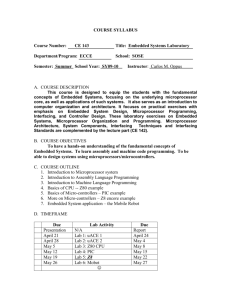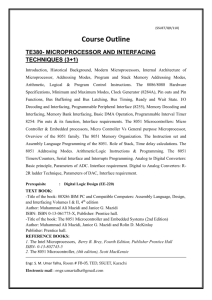Microprocessors & Interfacing
advertisement
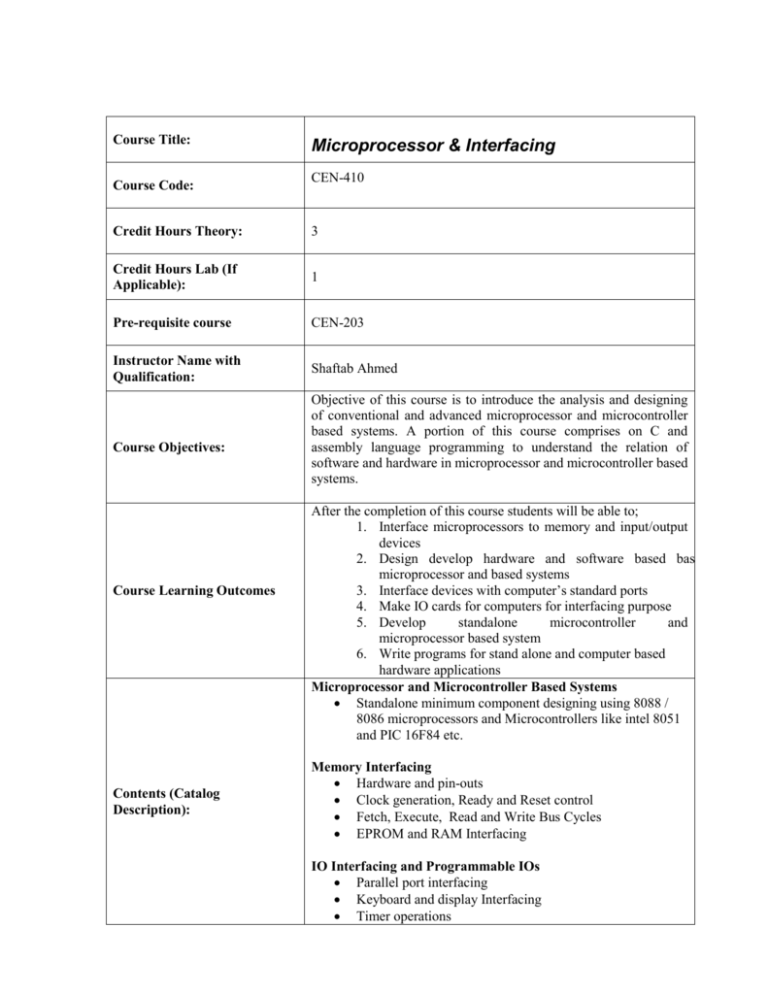
Course Title: Course Code: Microprocessor & Interfacing CEN-410 Credit Hours Theory: 3 Credit Hours Lab (If Applicable): 1 Pre-requisite course CEN-203 Instructor Name with Qualification: Shaftab Ahmed Course Objectives: Course Learning Outcomes Contents (Catalog Description): Objective of this course is to introduce the analysis and designing of conventional and advanced microprocessor and microcontroller based systems. A portion of this course comprises on C and assembly language programming to understand the relation of software and hardware in microprocessor and microcontroller based systems. After the completion of this course students will be able to; 1. Interface microprocessors to memory and input/output devices 2. Design develop hardware and software based basic microprocessor and based systems 3. Interface devices with computer’s standard ports 4. Make IO cards for computers for interfacing purpose 5. Develop standalone microcontroller and microprocessor based system 6. Write programs for stand alone and computer based hardware applications Microprocessor and Microcontroller Based Systems Standalone minimum component designing using 8088 / 8086 microprocessors and Microcontrollers like intel 8051 and PIC 16F84 etc. Memory Interfacing Hardware and pin-outs Clock generation, Ready and Reset control Fetch, Execute, Read and Write Bus Cycles EPROM and RAM Interfacing IO Interfacing and Programmable IOs Parallel port interfacing Keyboard and display Interfacing Timer operations Serial data communication MODEM interfacing and standards Communication standards Networked applications Interrupts Structure Hardware and software interrupts Expansion of hardware interrupts Timed functions Event Driven Applications Microprocessor based Data Acquisition and Control Interfacing A/D and D/A converters Interface with sensors and transducers Applications Recommended Text Books: Reference Books: 1. M.A. Mazidi and J. G. Mazidi, “The 8051 Microcontroller and Embedded Systems”, PHI.. 2. Barry B. Brey, “The Intel Microprocessors”, Prentice Hall, 6Ed. 2003 3. Scott Mackenzie, “The 8051 Microcontroller”, Prentice Hall 1. Douglas V. Hall, “Microprocessors and Interfacing” McGraw Hill 2. Walter A. Triebel, Avtar Singh, “The 8088 and 8086 Microprocessors”, fourth edition Prentice Hall Inc., 2002 3. A K Ray, K. M. Bhurchandi, “Advanced Microprocessors and Peripherals” Tata McGraw Hill Helping Web Sites: Use the course resources available in Yahoo group http://groups.yahoo.com/MPISpring2014 General Instructions for students: Home Works and Assignments Attendance is mandatory. Every class is important. All deadlines are hard. Under normal circumstances late work will not be accepted. 75% attendance is mandatory. Latecomers will be marked as absent. Students are required to take all the tests. No make-up tests will be given under normal circumstances. Any form of cheating on exams/assignments/quizzes is subject to serious penalty Quiz Tests Week 3 Quiz 1 Week 5 Quiz 2 Week 7 Quiz 3 Week 9 Quiz 4 Evaluation Criteria Assignments/projects Quizzes Mid-Term Final Exam 20% 10% 20% 50% Week # 1. Microcontroller 8051 Architecture and application programming I Week # 2. Microcontroller 8051 Architecture and application programming II Week # 3. Microcontroller 8051 Architecture and application programming III Week # 4. Week # 5. 8051 Hardware connection and Intel Hex file 8051 Timer programming in C Week # 6. 8051 Serial port programming in C Week # 7. 8051 Interrupt Programming in C Week # 8. 8051 LCD, KB, DAC, ADC interfacing Sixteen Week Lesson Plan Week # 9. MID TERM TEST Week # 10. Week # 11. Review of 8088 / 8086 microprocessor architecture Clock, Ready and Reset control 8088 / 8086 instruction set Programming in ASM 8088 - I Week # 12. Programming in ASM 8088 - II Week # 13. RAM and EPROM Interfacing, Parallel I/O interfacing (8255) Week # 14. Keyboard and LED / LCD display interfacing Week # 15. Parallel port interfacing and applications like stepper motor control Week # 16. Timer operations (8253) Week # 17. Interrupts Structure (8259); Hardware and software interrupts; Expansion of hardware interrupts Week # 18. FINAL EXAMS Course Learning Outcomes mapping to Program Learning Objectives CONTRIBUTION OF COURSE LEARNING OUTCOMES TO PROGRAMME LEARNING OUTCOMES SOFTWARE ENGINEERING Operating Systems No. Course Learning Outcomes Program Outcomes 1 2 3 4 5 6 7 8 9 1 Engineering Knowledge 2 Problem analysis 3 Design/Development of solutions 4 Investigation 5 Modern tool usage 6 Engineer and society 7 Environment and sustainability 8 Ethics 9 Individual and Team work 10 Communication 11 Project Management 12 Lifelong learning 10 11 12 Course Learning Outcomes mapping to Program Learning Objectives CONTRIBUTION OF COURSE LEARNING OUTCOMES TO PROGRAMME LEARNING OUTCOMES SOFTWARE ENGINEERING SOFTWARE PROJECT MANAGEMENT No. Course Learning Outcomes Program Outcomes 1 2 3 4 5 6 7 8 9 1 Engineering Knowledge 2 Problem analysis 3 Design/Development of solutions 4 Investigation 5 Modern tool usage 6 Engineer and society 7 Environment and sustainability 8 Ethics 9 Individual and Team work 10 Communication 11 Project Management 12 Lifelong learning 10 11 12
